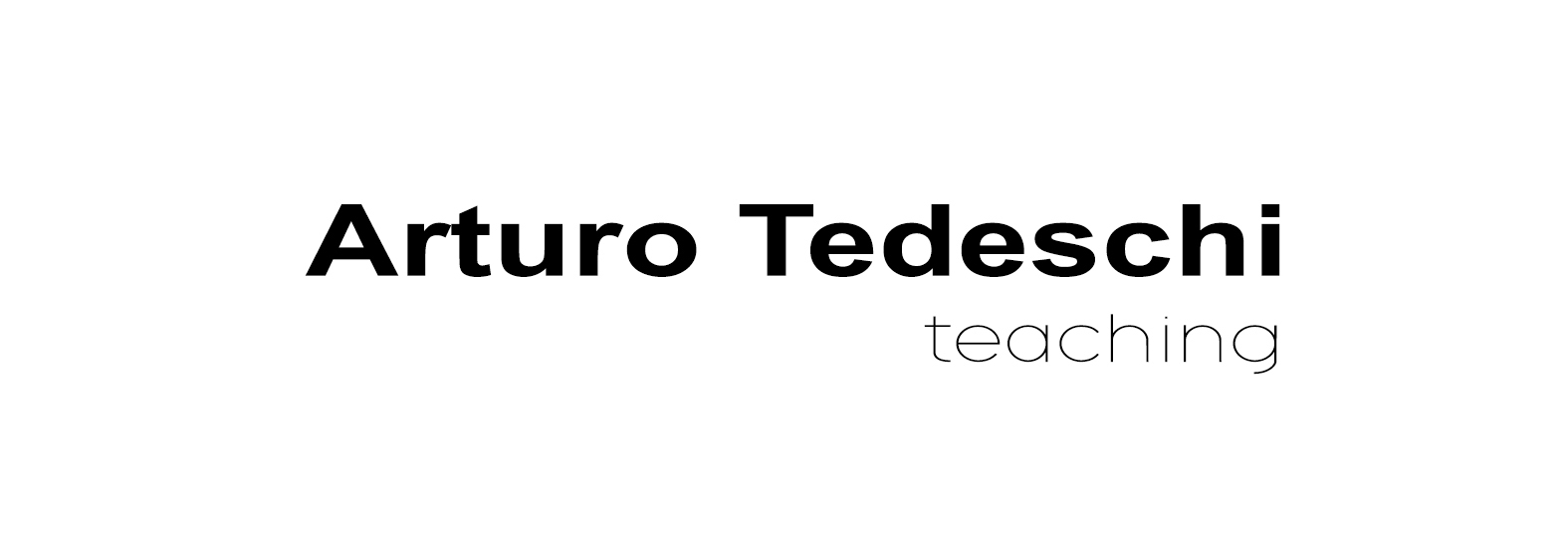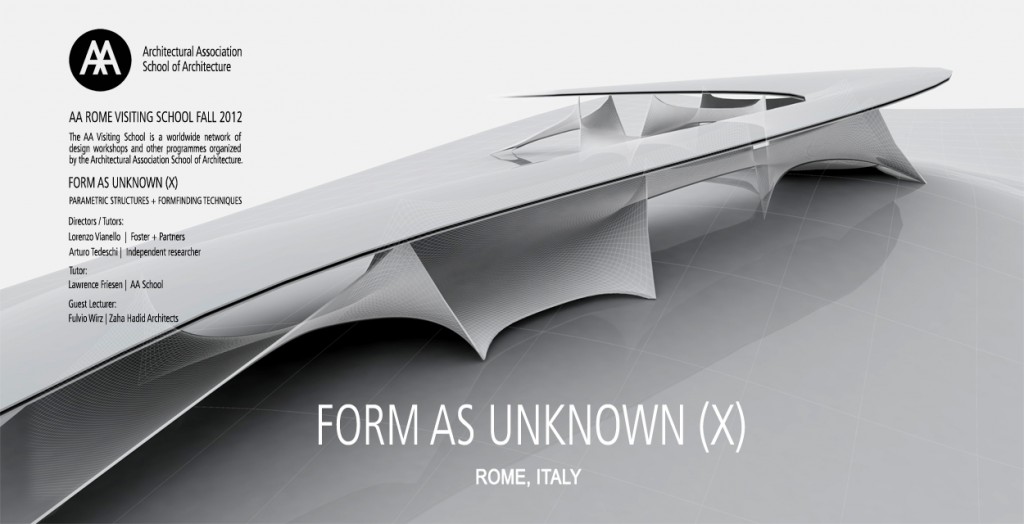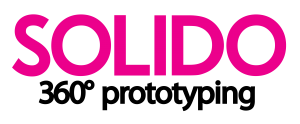Hi there and welcome to Brandspace, a new minimal multi-purpose WordPress Theme from Pixelentity. As with all of our themes, Brandspace is speedy, lightweight and bursting with the latest tech.
.
.
FORM AS UNKNOWN (X)
ROME | Wednesday 17 – Friday 26 October 2012
.
PROGRAMME DIRECTORS/TUTORS:
Lorenzo Vianello (Foster + Partners)
Arturo Tedeschi (Architect, Independent Researcher)
TUTOR:
Lawrence Friesen (AA Teacher)
Ludovico Lombardi (Zaha Hadid Architects)
GUEST LECTURER:
Fulvio Wirz (Zaha Hadid Architects)
.
PROGRAMME
The 10 day workshop investigates structural computational design, where students are engaging debate with Roman engineer Sergio Musmeci’s idea of ‘form as unknown’. According to his methodologies the structural form is not a priori, of which you only verify the safety margins, but instead it is ‘deducted from an optimization of its static conditions’.
The aim of the workshop is to develop parametric strategies which adapt form according to local site conditions and most importantly to social articulation of space usability. Once deployed on the site of Rome, these models will construct elegant context-specific structural, spatial and material organizations. The computational approach leads to discard the imposition of a prefixed form and instead create and use a performance driven procedure.
On a team-based structure students will pursue their computational design researches coupling physical analogue experiments with algorithmic digital tooling. Finally digitally fabricated prototypes of their projects will be tested for real structural performances and richness of their tectonic articulation.
APPLICATIONS
The deadline for applications is 3 october 2012. Application forms and additional information are available online at: http://www.aaschool.ac.uk/STUDY/VISITING/rome and applications can be submitted to: visitingschool@aaschool.ac.uk. All participants travelling from abroad are responsible for securing any visa required for entry to Italy, and are advised to contact their home embassy early. After payment of fees, the AA School can provide a letter confirming participation in the workshop. Applicants are advised to contact the AA as soon as possible in order to apply and confirm a place, as space is limited.
REGISTRATIONS for the AA Rome Visiting School are NOW CLOSED, because all the available places are taken.
Due to the great request, we are planning another AA Visiting School in Rome to happen in the next Spring. The topic will still be regarding cutting-edge parametric design linked to pioneering researches from the past.
Please write to the directors Lorenzo Vianello and Arturo Tedeschi to learn more about this: rome@aaschool.ac.uk
FEES
The AA Visiting School requires a fee of £695 per participant, which includes a £60 Visiting Student Membership, payable online at: http://www.aaschool.ac.uk/STUDY/VISITING/rome. Fees do not include flights or accommodation, but accommodation options can be advised.
Students need to bring their own laptops, digital equipment and modelmaking tools. Please ensure this equipment is covered by your own insurance as the AA takes no responsibility for items lost or stolen at the workshop.
ELIGIBILITY
The workshop is open to architecture, engineering and design students and professionals worldwide. No previous experience in computational design and digital fabrication is needed; the workshop will offer both introductory instruction for beginners and advanced instruction for experienced users.
VENUE
GALLERIA “COME SE”, Roma, Via dei Bruzi 4/6
www.comese.me.it/
DIRECTORS/TUTORS
Lorenzo Vianello graduated in architecture in Italy in 2005. From 2005 to 2009 he collaborated with several firms, including OMA, Studio Fuksas and UNStudio. From 2009 to 2011 he deepened his research, attending the Design Research Laboratory programme at the Architectural Association. Here he was guided by tutor Patrik Schumacher, partner at Zaha Hadid Architects, during the development of his final thesis. The theme of the thesis was a proto-tower, system of algorithms that generate projects of high-rises with optimized properties for different environments and functional programmes. Lorenzo currently is based in London and works as an architect at Foster and Partners.
Arturo Tedeschi, architect, since 2004 complemented professional practice in Italy with a personal research on parametric design and form-finding techniques, focusing on relationships between architecture and new design tools. In 2010 he published “Parametric Architecture with Grasshopper”, a bestseller book on parametric modeling, now in its second edition and translated in English. In the same year he cooperated with Zaha Hadid Architects in London. Since 2011 he has been teaching workshops on parametric design in Italy.
TUTOR
Lawrence Friesen studied at Dalhousie University and worked at a number of architectural practices in Canada before setting up the Generative Geometry group at Buro Happold. In the past nine years he has taken part in a number of complex projects whose innovative realisation entailed digital fabrication. Currently he works as consultant at Generative Geometry and technical studies tutor at the Architectural Association.
Ludovico Lombardi, graduated with a Master’s degree in Architecture and Urbanism from the DRL at the Architectural Association in London, he collaborated with Carlos Ferrater, Arata Isozaki and Zaha Hadid architects, where he currently works as Lead Architect. Ludovico has appeared as guest critic at the Architectural Association and for the DRL and taught at the Bartlett School of Architecture, UCL, London, where he was Unit tutor for the Unit 6, Master in Urban design directed by Colin Fournier. He has previously taught at Politecnico of Milan as an undergraduate design tutor.
GUEST LECTURER
Fulvio Wirz is a lead architect at Zaha Hadid Architects in London, were he worked on many award-winning projects. He was project manager for “Aura”, an installation exposed at Villa Foscari at Biennale di Venezia in 2008 and co-head for the Opera House in Dubai and for the KAPSARC project: a center for energetic research in Saudi Arabia. He taught “Fundamentals of Parametric Architecture” at Milan Polytechnic University. From October 2011 is co-director of Research Cluster 6 Graduate Program at the Bartlett School of Architecture, London.
TUTOR’S ASSISTANT
Maurizio Arturo degni is a computational designer at Studio Kami as well as assisting in tutorials at Università degli Studi di Roma La Sapienza. His research is focused on relationships between parametric systems and environmental technology. He is currently involved in a series of parametric design workshops in Italy, directed by Arturo Tedeschi.
CONTACT
For any information please contact: info@arturotedeschi.com
.
ADDITIONAL INFORMATIONS
Program directors: Lorenzo Vianello, Arturo Tedeschi
AA Visiting School director: Christopher Pierce
AA Visiting School coordinator: Karina Joseph
T: +44 20 7887 4014
F: +44 20 7414 0782
E: visitingschool@aaschool.ac.uk
Architectural Association School of Architecture
36 Bedford Square, London WC1B 3ES, UK
.
WEBSITE:
http://www.aaschool.ac.uk/STUDY/VISITING/rome
FACEBOOK PAGE:
http://www.facebook.com/AARomeVisitingSchool
FAQ
PARTNERS:
.
.
.


